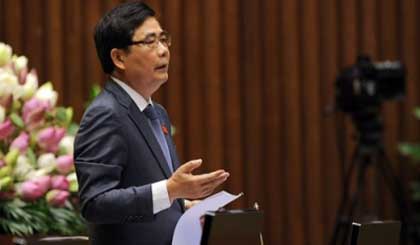National Assembly questions Cabinet Members
The National Assembly continued the question and answer (Q&A) session with Cabinet members on June 11 presided by Chairman Nguyen Sinh Hung.
Minister of Agriculture and Rural Development Cao Duc Phat, was the first to appear at the session. He reported on the implementation of the national target program on building new-style rural areas; the ties between the State, scientists, businesses and farmers; solutions to stabilize farm output, and plans for sustainable development of industrial crops in Vietnam.
 |
| Minister of Agriculture and Rural Development Cao Duc Phat |
Answering queries on solutions to stabilize farm output, the minister said that Vietnam promotes international integration and its crop structure needs to be aligned with global trends. Especially amidst deeper economic integration in the world, it necessary to focus on strong produce varieties in Vietnam while helping farmers increase their product quality and cut down prices to ensure the purchase of farm produce under any circumstances.
Support offered in recent years will be maintained, such as assisting farmers in improving product competitiveness, stabilising prices and taking out concessional loans to minimise losses. Minister Phat said that the ministry will continue efforts to tackle difficulties facing agricultural businesses and develop preserving and processing technologies.
On the question of coordination between State agencies, businesses, scientists and farmers, which has fallen behind expectations, Minister Phat said although coordination has been common in milk and sugar production, it is still weak in products that are not necessarily processed, like rice. In 2014, more than 100 companies committed to working with farmers to grow and buy 72,000 hectares of rice in the Mekong Delta, but the collaboration was only realised on about 45,000 hectares.
According to the minister, the insufficient co-ordination was partly to blame on the shortage of agricultural businesses, which he said are the key players in the ties.
The limited number of co-operatives in rural areas, especially the Mekong Delta – Vietnam’s rice production hub – has also made it harder for businesses to work with farmers since cooperatives act as intermediaries, he added.
He also emphasied the decisive role of local authorities in the success of this affiliation, noting that they should step up communications to encourage farmers to co-ordinate, provide support policies for enterprises and facilitate the establishment of co-operatives.
Some deputies raised queries regarding farmers’ lack of interest in rice cultivation. Minister Phat said a government decree issued in 2012 provides policies preventing the pliant conversion of rice farming land for other uses, especially non-agricultural purposes such as building residential areas.
He agreed that farmland must be protected, but not by forcing farmers to grow rice which limits their income. Rice can be replaced by other crops. He also revealed that his ministry is designing a synchronous and efficient rice export plan to profit farmers, but it will take more time and resources to develop.
The minister reported that due to sluggish rice sales amidst the import of over 5 million tonnes of corn in 2014, Prime Minister Nguyen Tan Dung decided to support farmers to shift from farming rice to growing other crops in the Mekong Delta.
(Source: nhandan.org.vn)
 về đầu trang
về đầu trang







